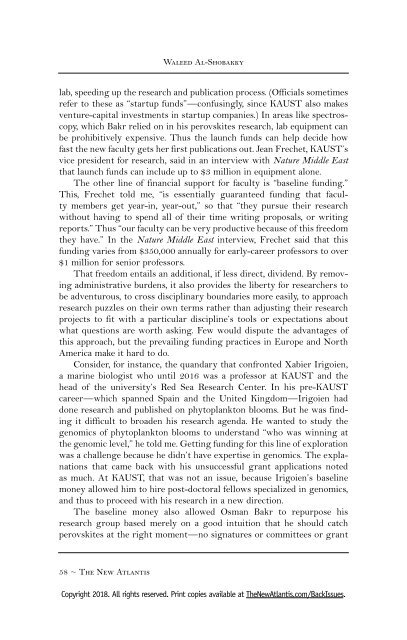The New Atlantis - Winter 2018 (Issue 54) uncompressed with cover
Create successful ePaper yourself
Turn your PDF publications into a flip-book with our unique Google optimized e-Paper software.
Waleed Al-Shobakky<br />
lab, speeding up the research and publication process. (Officials sometimes<br />
refer to these as “startup funds” — confusingly, since KAUST also makes<br />
venture-capital investments in startup companies.) In areas like spectroscopy,<br />
which Bakr relied on in his perovskites research, lab equipment can<br />
be prohibitively expensive. Thus the launch funds can help decide how<br />
fast the new faculty gets her first publications out. Jean Frechet, KAUST’s<br />
vice president for research, said in an interview <strong>with</strong> Nature Middle East<br />
that launch funds can include up to $3 million in equipment alone.<br />
<strong>The</strong> other line of financial support for faculty is “baseline funding.”<br />
This, Frechet told me, “is essentially guaranteed funding that faculty<br />
members get year-in, year-out,” so that “they pursue their research<br />
<strong>with</strong>out having to spend all of their time writing proposals, or writing<br />
reports.” Thus “our faculty can be very productive because of this freedom<br />
they have.” In the Nature Middle East interview, Frechet said that this<br />
funding varies from $350,000 annually for early-career professors to over<br />
$1 million for senior professors.<br />
That freedom entails an additional, if less direct, dividend. By removing<br />
administrative burdens, it also provides the liberty for researchers to<br />
be adventurous, to cross disciplinary boundaries more easily, to approach<br />
research puzzles on their own terms rather than adjusting their research<br />
projects to fit <strong>with</strong> a particular discipline’s tools or expectations about<br />
what questions are worth asking. Few would dispute the advantages of<br />
this approach, but the prevailing funding practices in Europe and North<br />
America make it hard to do.<br />
Consider, for instance, the quandary that confronted Xabier Irigoien,<br />
a marine biologist who until 2016 was a professor at KAUST and the<br />
head of the university’s Red Sea Research Center. In his pre-KAUST<br />
career — which spanned Spain and the United Kingdom — Irigoien had<br />
done research and published on phytoplankton blooms. But he was finding<br />
it difficult to broaden his research agenda. He wanted to study the<br />
genomics of phytoplankton blooms to understand “who was winning at<br />
the genomic level,” he told me. Getting funding for this line of exploration<br />
was a challenge because he didn’t have expertise in genomics. <strong>The</strong> explanations<br />
that came back <strong>with</strong> his unsuccessful grant applications noted<br />
as much. At KAUST, that was not an issue, because Irigoien’s baseline<br />
money allowed him to hire post-doctoral fellows specialized in genomics,<br />
and thus to proceed <strong>with</strong> his research in a new direction.<br />
<strong>The</strong> baseline money also allowed Osman Bakr to repurpose his<br />
research group based merely on a good intuition that he should catch<br />
perovskites at the right moment — no signatures or committees or grant<br />
58 ~ <strong>The</strong> <strong>New</strong> <strong>Atlantis</strong><br />
Copyright <strong>2018</strong>. All rights reserved. Print copies available at <strong>The</strong><strong>New</strong><strong>Atlantis</strong>.com/Back<strong>Issue</strong>s.


